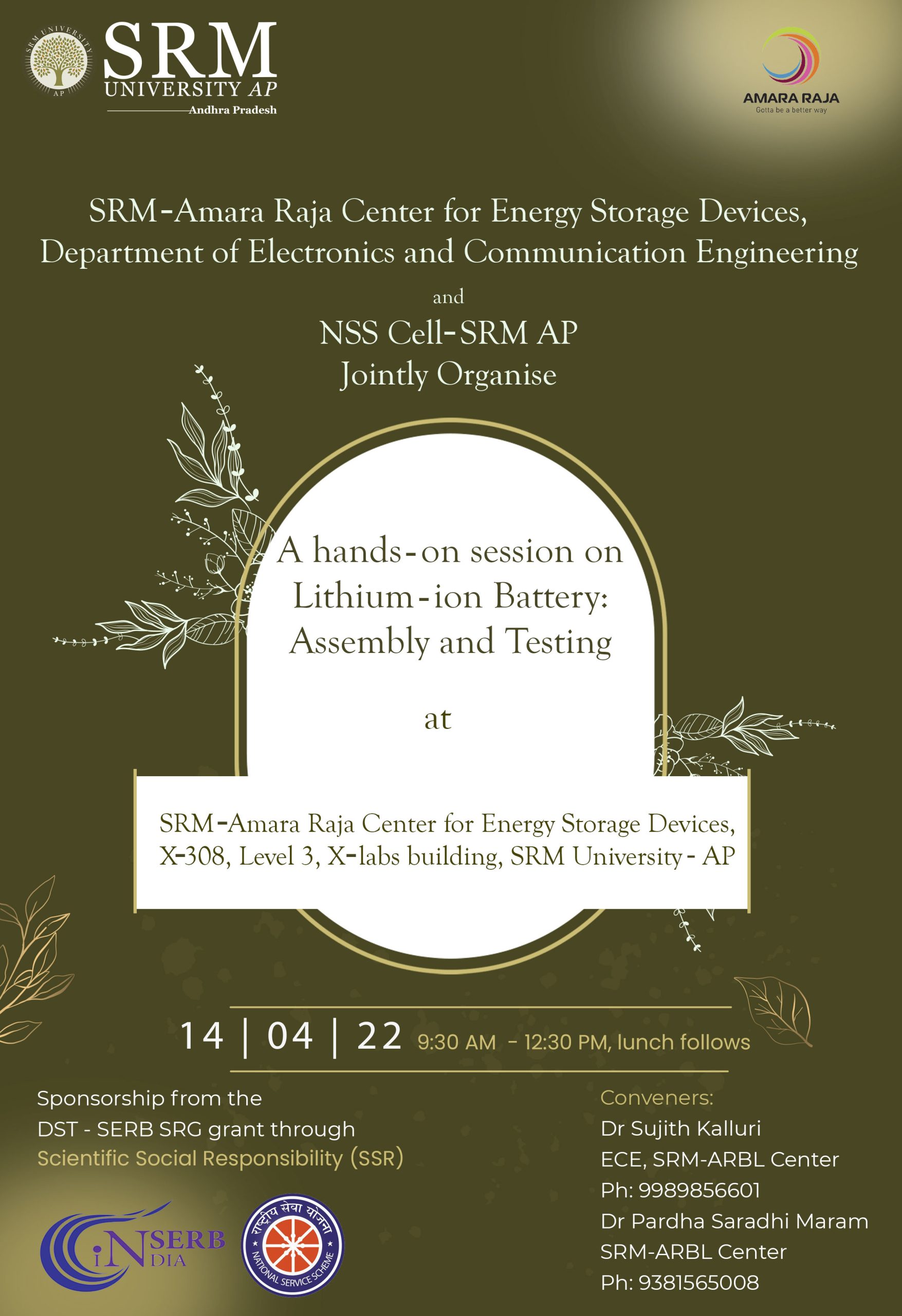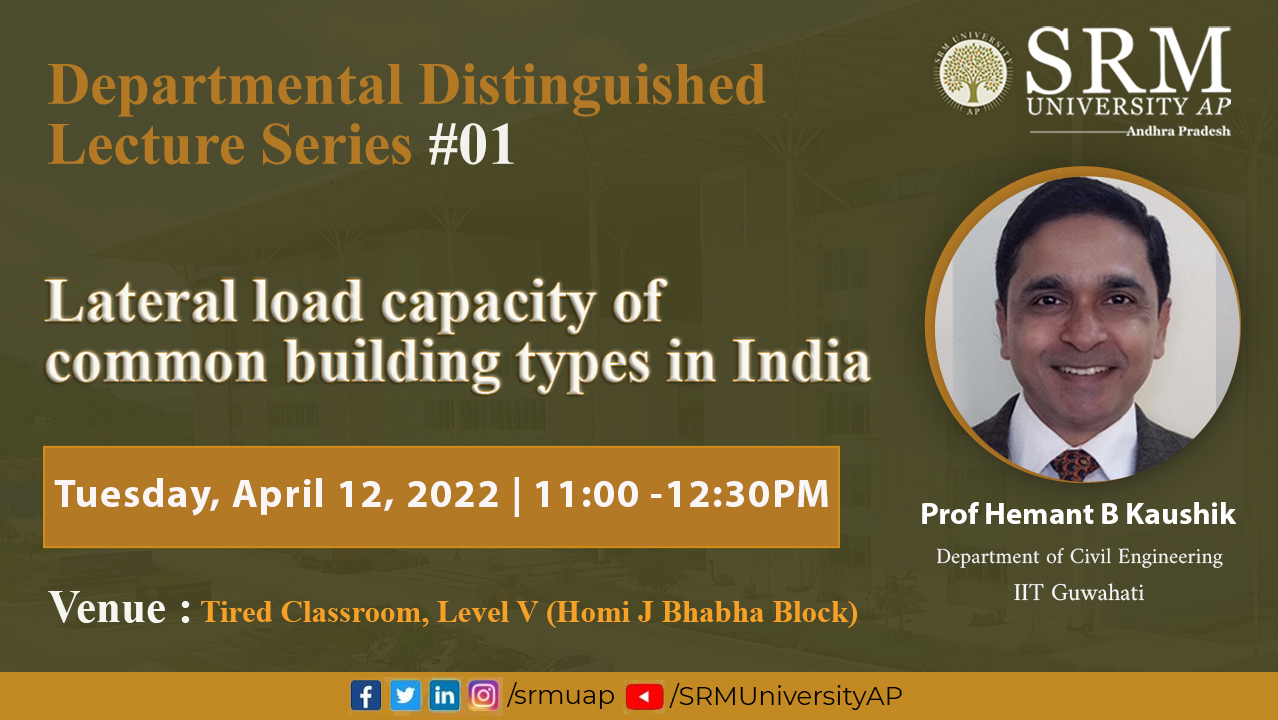SRMAP Departmental Events
- Ultra-low power and agile IC design for novel sensor nodes for the Internet of Things April 20, 2022
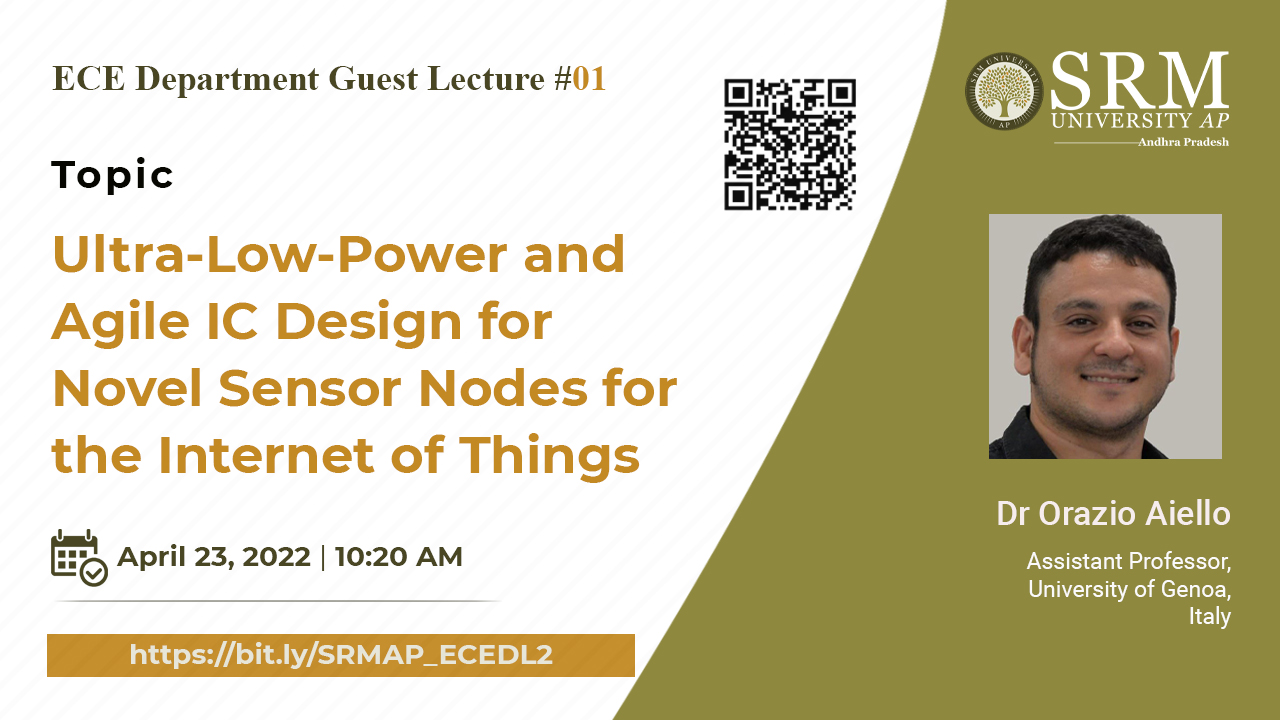
The Internet of Things (IoT) has greatly increased our awareness of the world and broadened the scope of our engagement with it. In the first episode of the ECE Department Guest Lecture Series, the Department of Electronics and Communication Engineering at SRM University-AP is organising a lecture on April 23, 2022, from 10.20 am to 12.00 noon. Dr Orazio Aiello, Assistant Professor at the University of Genoa, Italy, will engage the audience on the topic Ultra-Low-Power and Agile IC Design for novel Sensor Nodes for the Internet of Things on that day.
The vision of a world where pervasive integrated electronic systems embedded in everyday life objects (e.g. household appliances, surveillance cameras, healthcare systems) are fully interconnected to collect, process, and exchange useful information requires energy-autonomous systems for distributed sensing and data acquisition. The low-cost requirement demands a small area, low design effort, digital-like shrinkage across CMOS generations, and design/technology portability. The possibility to exploit the digital (automated) design flow even for analog building blocks can dramatically reduce the design effort of any system-on-chip that faces the analog signal. Since data processing is digital, but most signals from the real world are analog, almost any electronic device that interfaces with the surrounding environment will benefit from the outcomes of this investigation. In this framework, the talk illustrates the concepts and the design flows which enable the implementation of analog functions by true digital circuits.
Biography of the speaker:
Orazio Aiello (Senior Member, IEEE) received the BSc and MSc degrees (cum laude) from the University of Catania, Italy, in 2005 and 2008, respectively, the M.Sc. degree (cum laude) from the Scuola Superiore di Catania, Italy, in 2009, and the PhD degree from the Politecnico di Torino, Italy, in 2013.,From 2008 to 2009, he was an Analog IC Designer and an EMC Consultant for STMicroelectronics, Castelletto, Italy. In 2012, he was a Visiting PhD. A student with Monash University, Melbourne, Australia. In 2013, he was a Research Fellow in a joint project with FIAT-Chrysler Automobiles, Turin. In 2014, he joined NXP-Semiconductors, Nijmegen, The Netherlands, as a Mixed Signal IC Designer and an EMC Expert. In 2015 and 2016, he was a Visiting Fellow with the University of Sydney and the University of New South Wales, Sydney, Australia. Since 2015, he has been working with the Green IC Group, Department of Electronics and Communication Engineering (ECE), National University of Singapore, where he has also been a Marie Skłodowska-Curie Individual and a Global Fellow leading the ULPIoT project. He is now an Assistant Professor at the University of Genova, Italy. His main research interests include energy-efficient analogue-mixed signal circuits and sensor interfaces. Dr Aiello is a member of the IEEE CASS Microlearning AdHoc Committee and is/was a Technical Program Committee Member of a number of conferences, such as NORCAS and APCCAS.
Join this informative lecture with Dr Orazio Aiello on April 23, 2022 at 10.20 am IST.
Continue reading → - The art of airport engineering April 20, 2022
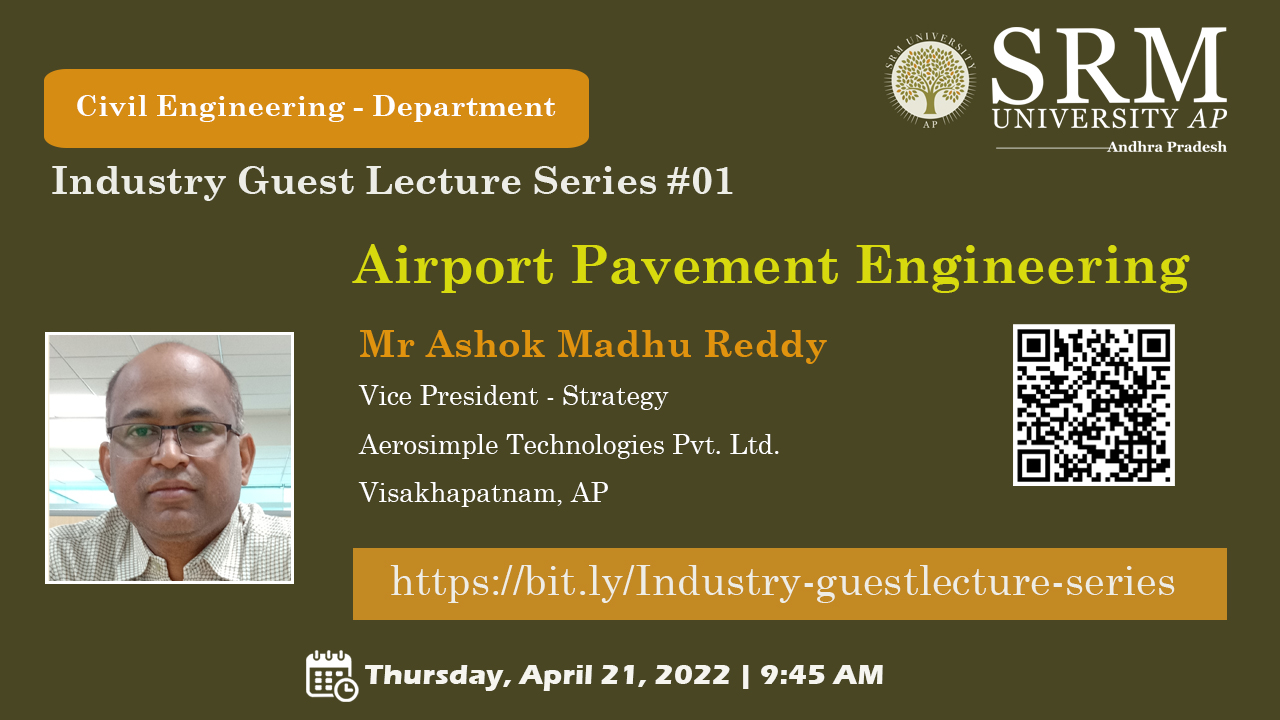 The Department of Civil Engineering is all set to kick start their first Industry Guest Lecture Series on April 21, 2022. The lecture is scheduled from 9.45 am to 10.45 am followed by a Q&A session. Renowned aviation professional Mr Ashok Madhu Reddy, who has an experience of 25 years in airplane or airport operation, will deliver the talk on Airport Pavement Engineering.
The Department of Civil Engineering is all set to kick start their first Industry Guest Lecture Series on April 21, 2022. The lecture is scheduled from 9.45 am to 10.45 am followed by a Q&A session. Renowned aviation professional Mr Ashok Madhu Reddy, who has an experience of 25 years in airplane or airport operation, will deliver the talk on Airport Pavement Engineering.The viability of the airport infrastructure is indeed a challenge in airport engineering. Airport pavement plays an important role in this scenario. The lecture intends to discuss the History of ICAO, airport planning, design, and maintenance in detail.
About the Speaker
Mr Ashok Madhu Reddy is an aviation professional with 25 years of experience in Airline/Airport Operations and Management. He is presently working as the Vice President of Aerosimple Technologies Pvt. Ltd., Visakhapatnam, AP which is an IT software company that specialises in SAAS for Airport operations and Management, serving 35 airports across the globe.
He was India’s first personnel who attained the “International Airport Professional” certification jointly issued by International Civil Aviation Organization (ICAO) and Airports Council International (ACI) Montreal, Canada. This was the only program in the world recognized by the United Nations (UN) to bring global standards worldwide. He is also a Board Director of the American/International Association of Airport Executives (AAAE/IAAAE).
Mr Ashok has two post-graduation degrees in management from India and UK. Previously, he worked with Air India, Srilankan Airlines, GMR Hyderabad and Delhi Airports, and AP Airport Development Corporation in various management capacities. He is also having multiple aviation certification courses to his credit.
Register for the webinar and get to know about Airport Pavement Engineering from the professional himself.
Continue reading → - Scalar conservation laws in one space dimension with strict convex flux April 20, 2022
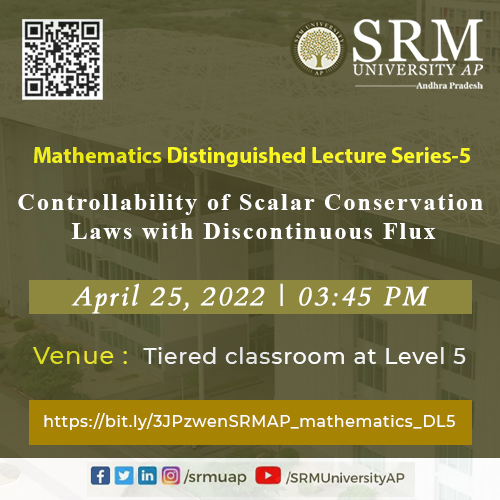
The Department of Mathematics is arranging the fifth instalment of the Departmental Distinguished Lecture Series on April 25, 2022, at 3.45 pm IST. Reputed Mathematician, Prof A Adimurthi will deliver an informative lecture on the topic ‘Controllability of Scalar Conservation Laws with Discontinuous Flux’.
About the Talk
Navier-Stokes and Euler equations play an important role in studying the flow of incompressible fluids. Weak solutions to these equations can be obtained by Galerkin method but the uniqueness is a big open problem. It is a big challenge to obtain an extra condition for the class of functions, so that in this class obtain the existence and uniqueness. To understand this phenomenon, it is better to look at a one-dimensional case where the equation turns out to be viscous Burger’s equation or Burger’s equation with non-linearity is of quadratic order. In this talk, we will restrict to Burger’s type equations called the Scalar Conservation Laws in one space dimension with strict convex flux. Way back in the 50’s, this equation was studied by Lax and Oleinik and obtained an explicit formula for a solution. Oleinik showed that this satisfies an extraction called the Entropy Condition and then showed that in this class, the solution is unique. Later Kruzkov, in an ingenious way, generalized this to obtain a unique solution for Scalar Conservation Law in higher dimensions and Lipschitz fluxes. This result was taken up by Zuazua and his collaborators and studied the Optimal Controllability for Burgers equation. They showed the existence of optimal control and to capture this, they derived a numerical algorithm whose convergence is still open. In a different direction, this was attacked, and the problem was completely solved. Getting the optimal solution is via projection method in a Hilbert space. Recently, this was extended in a non-trivial way to conservation laws with convex discontinuous flux. The talk will explain the main ideas of this work.
About the Speaker
A mathematician of repute, Prof A Adimurthi has been associated with the Tata Institute of Fundamental Research, Centre for Applicable Mathematics Bangalore. At present, he is working as a visiting professor at the Department of Mathematics and Statistics, IIT Kanpur. He has authored more than a hundred research articles on a wide range of topics including Partial differential equations, Functional analysis, Numerical analysis, Calculus of variations, Optimal control, and many others. Prof Adi Adimurthi has been elected as a fellow of; The Indian Academy of Sciences (F.A.Sc) Bengaluru (1996), The National Academy of Sciences (F.N.A.Sc), India in 1997, The Indian National Science Academy (F.N.A) in 1998, The World Academy of Sciences(TWAS) in 2018, Raja Ramanna and DST J.C. Bose National. Along with these fellowships, Professor Adimurthi has also been honoured with the prestigious Dr Zakir Hussain Award in 2013.
Join this informative talk with Prof A Adimurthi on April 25, 2022 at 3.45 pm IST.
- A hands-on session on lithium-ion battery: assembly and testing April 13, 2022
Allowing students to explore more into their learning domain will invariably enhance their quest for knowledge. The more students are encouraged to experiment with problems, tools, and substances they will work with, the better prepared they are to face any challenge head-on. It is also a better rewarding alternative as against the conventional book learning method.
Taking the current scenario into account,imparting hands-on training on cutting-edge developments is an excellent exercise to inculcate scientific spirit in young minds. Such initiatives should be actively promoted to equip students on par with the fast-evolving technological realm. We are delighted to announce that the SRM-Amara Raja Center for Energy Storage Devices, Department of Electronics and Communication Engineering, collaborates with NSS Cell-SRM AP to organise a “Hands-on Session on Lithium-ion Battery: Assembly and Testing” with the sponsorship from the DST-SERB Start-up Research Grant (SRG).
Date: April 14, 2022
Time: 9.30 am to 12.30 pm IST
We invite all the interested students to become part of this invigorating initiative and make the best use of this opportunity to receive an enriching training session. The event is also followed by lunch for all the participants.
- Lateral load capacity of common building types in India April 11, 2022
The Department of Civil Engineering is organising the first physical lecture as part of the Departmental Distinguished Lecture Series on April 12, 2022 from 11.00 pm to 12.30 pm. Prof Hemant B Kaushik from the Department of Civil Engineering, IIT Guwahati is the distinguished speaker of the event. He will deliver a talk on the topic “Lateral load capacity of common building types in India”. This talk will provide detailed insights into the seismic behaviour of different building types in India. Various experimental results of full-scale model tests on shake tables and actuators will also be presented.
Speaker’s Profile
Prof Hemant B Kaushik is currently working at IIT Guwahati in the Department of Civil Engineering and Centre for Disaster Management and Research. He is also the Associate Dean of Academic Affairs and the Head of the Centre for Educational Technology. His research areas broadly include: earthquake resistant design of structures, nonlinear behavior of structures, retrofitting of structures, seismic vulnerability assessment of structures, earthquake damage surveys etc. He was the recipient of the INAE Young Scientist Award in 2010 and 2013. He also received the David Fischetti Award in 2019, presented by the Preservation Engineering Technical Committee (PETC) of the Association for Preservation Technology International (APT), USA. The award recognises an outstanding article in a peer-reviewed publication that advances the field of conservation engineering. Prof Kaushik is also a member of the Earthquake Engineering Sectional Committee, CED 39, Bureau of Indian Standards. He also holds membership in several professional bodies like Earthquake Engineering Research Institute (EERI), USA, American Society of Civil Engineers (ASCE), USA, The Masonry Society (TMS), USA, Indian Society of Earthquake Technology (ISET), India and Institution of Engineers, India. He has contributed several post-earthquake reconnaissance study reports and papers in reputed journals and conferences.
All are invited to join this informative lecture on Tuesday, April 12, 2022, from 11.00 pm to 12:30 pm.


